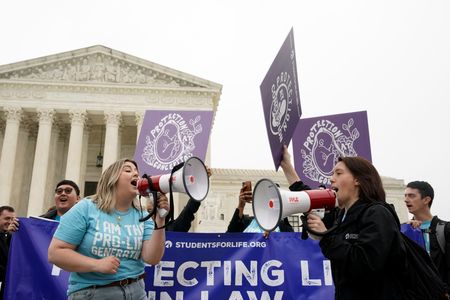 1
1 1
1
By Andrew Goudsward
(Reuters) – A U.S. appeals court on Tuesday revived part of a lawsuit claiming that the District of Columbia enforced an anti-graffiti law against anti-abortion protesters in Washington but not racial justice demonstrators in 2020.
The U.S. Court of Appeals for the D.C. Circuit, in a unanimous 3-0 decision, found that two anti-abortion groups had plausibly alleged that the D.C. government “discriminated on the basis of viewpoint in the selective enforcement of its defacement ordinance.”
The groups, the Frederick Douglass Foundation and Students for Life of America, sued the D.C. government in 2021 after local police arrested two protesters who wrote “Black Pre-Born Lives Matter” on a public sidewalk during an August 2020 demonstration.
The foundation claimed D.C. authorities abandoned enforcement of the anti-graffiti law during widespread protests in the city following the murder of George Floyd by police in Minneapolis. Yet that same summer, the group claimed, the restriction was “vigorously” enforced against them.
“Washington officials can’t censor messages they disagree with,” Erin Hawley, a lawyer for the organizations with the conservative legal group Alliance Defending Freedom, said in a statement.
The district argued that it focused police resources on other priorities during large demonstrations that followed Floyd’s death. A spokesperson for the D.C. attorney general did not immediately return a request for comment.
U.S. District Judge James Boasberg dismissed the lawsuit in 2021, finding that the groups did not produce evidence of discriminatory intent by the D.C. government.
The appeals court found that the organizations only had to show that the two sets of protesters were in similar situations and that enforcement of the law violated the anti-abortion groups’ right to freedom of speech under the U.S. Constitution.
“It is fundamental to our free speech rights that the government cannot pick and choose between speakers, not when regulating and not when enforcing the laws,” the court said.
(Reporting by Andrew Goudsward; Editing by David Bario and Jonathan Oatis)